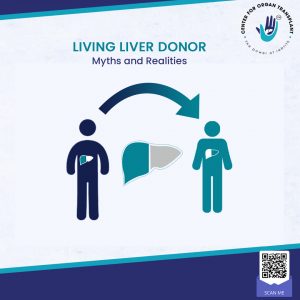Pravin Patole (Transplant Year: 2021)
Treatment : Liver Transplant
Saket Khadakkar (Transplant Year: 2021)
Treatment : Liver Transplant
Pravin Patole (Transplant Year: 2021)
Treatment : Liver Transplant
Saket Khadakkar (Transplant Year: 2021)
Treatment : Liver Transplant
Pravin Patole (Transplant Year: 2021)
Treatment : Liver Transplant
Saket Khadakkar (Transplant Year: 2021)
Treatment : Liver Transplant
Error: Contact form not found.

Every year on November 27, India commemorates its organ donation day. The government encourages Indian citizens to donate their organs and save lives on this day. On the occasion of organ donation day, we will raise awareness about living liver donor myths and realities about it.
Reality: You don’t have to be related to someone by blood to receive a liver transplant from them.
Reality: A living liver donor must have a suitable blood type, although not necessarily the same blood type as the recipient. The recipient’s blood type determines which blood types are compatible. A liver from a blood group O donor can also be given to anyone.
Reality: Medications are required for the first several weeks following donation surgery for living donors. This is a one-time requirement.
Reality: Donors enjoy a regular life after recovery, with no restrictions on their activities.
Reality: Female donors can have healthy pregnancies post donation. But pregnancy should be postponed for at least a year after donation.
Reality: During the evaluation process, donors have the option to change their minds about donating at any time. If a donor chooses not to donate, they are not responsible for informing the receiver.
Reality: The recipient’s insurance policy is responsible for donor evaluation, hospital care, and related follow-up care expenses.
Reality: Expenses linked to the donor examination, hospitalization, and subsequent follow-up care are covered by the recipient’s insurance.
Reality: The reality is that the donor’s evaluation process is kept private. The recipient can only receive information from the donor. The Donor Team is not allowed to speak with the recipient directly.
Recent Comments